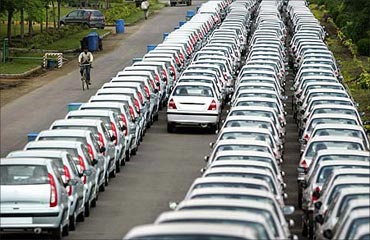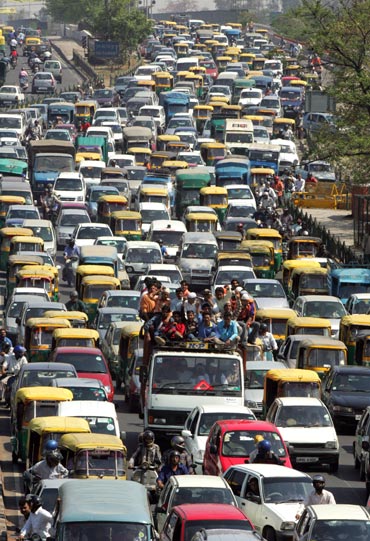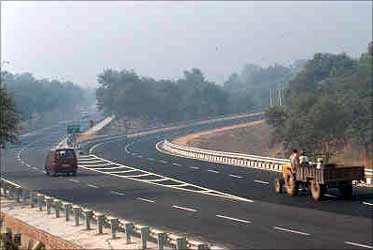
Recently we have heard the government give us this wonderful view of an India where over $1 trillion, or about Rs 50,00,000 crore, will be spent on infrastructure projects.
At a conference I attended in New Delhi in March, 2010, I heard every Union minister who mattered speak about what his department and secretariat plan to do on the infrastructure side.
The programme was inaugurated by Prime Minister Manmohan Singh, overseen by Deputy Planning Commissioner Montek Singh Ahluwalia, with a glimpse from the Finance Minister on how it all was to be funded.
India was open for business and meant business.
The $1 trillion spend was our answer to the China infrastructure miracle. Jai Ho!
. . .

Slippery oil
The infrastructure plan itself is, as such, not a plan in the grand sense of the word.
Every department had its plans to spend -- that was true. But was anyone thinking about which department really needed more money? Or which department deserved more money in the overall 'where is India heading' sense?
For example, there was no discussion on whether all the road building of 20 km per day being adopted with great gusto would ever be matched with the mundane -- but eventually critical -- need for more petrol to fuel the cars that will be driven on these roads.
I have not heard the ministry of petroleum raise any objections or concerns on this ambitious road-building plan. But here are some numbers with some quick assumptions.
I am sure the members of the Planning Commission -- accused of sitting on armchairs by the road builders -- have more hard data than my 5-minute checklist, but here goes:
| Following the US model of building roadways | |
| Kms driven on average each year by an Indian car | 10,000 |
| Fuel efficiency of a typical city-driven car (km/litre) | 10 |
| Litres needed every year for each car | 1,000 |
| Number of new cars every year (millions) | 1 |
| Litres required for the new cars (millions) | 1,000 |
| Litres in 1 barrel of oil | 159 |
| Barrels of oil required (millions) | 6.3 |
| Price per barrel, refined and landed in India, $ | 85 |
| New money spent every year on oil for cars ($ million) | 535 |
. . .

A car in India on an average is probably used for about 10,000 km of driving every year. Assuming that a typical car delivers 10 km per 1 litre of petrol, this suggests the car needs 1,000 litres every year.
And assume that, because the roads are being built and car ownership is being encouraged, Indians buy 1 million additional cars every year: that means we need 1 billion litres of extra petrol every year to fuel those extra 1 million new cars.
Since there are about 159 litres in a barrel of oil, this works out to about 50 million barrels of refined and finished petrol -- new demand created every year.
A barrel of crude oil sells for $75; add transportation and refining costs and we get to maybe $85 per barrel.
So we need to buy $535 million worth of crude oil for the extra 1 million cars.
But what if the price of crude oil increases? Not so long ago, we saw crude oil prices at $150 per barrel. Maybe those high oil prices will come back to haunt us in the next few years.
. . .

Building an America, or a Europe
Should the road minister be working with the railway minister on a plan to build railway tracks in between the roads that can allow trains to ferry passengers and cars?
Should there be a system that allows a person going from Mumbai to Pune to reach a parking lot at a train station at the start of the Mumbai expressway, park his car, board an express train to Pune, get off at the other end, rent a car or taxi, finish his work and -- on the reverse commute -- pick up his car and head home?
Is a plan to link the two growing metropolitan regions like Mumbai and Pune feasible?
I don't know but maybe the ministers -- with all their information-gathering powers -- could figure that out.
The point is, when a build-out for infrastructure is being built out, shouldn't this be the main area of discussion?
Are we building a country like the United States of America where the automobile is the centre of all activity? Or are we building a Europe where public transportation is encouraged? People do own cars in Europe, but they use them a lot less than in the US.
Given the fact that we are already importing over 70 per cent of our energy needs, which model should we be working towards?
. . .

China has, in some sense, made a mistake. They have gone the US route of building roads to encourage the production and sale of cars. China has now surpassed the US as the largest consumer of energy in the world due to its car policy and also due to its reliance on manufacturing.
Don't get me wrong -- our roads are abysmal and we definitely need roads. But don't we also need a viable public transportation system?
Building roads and bridges in every city for cars will only lead to the purchase of more cars -- adding to traffic, pollution, and to our vulnerability to swings in oil prices.
No, this is not an argument to head back to the bullock-cart age. It is a doubt about the true future cost of what we are doing today.
Neither the armchair economists in the Planning Commission nor the ministers running the various sectors may be really planning for the future. They seem to be more focussed on how to get a quick solution for the pathetic state of India's infrastructure.
To show that India can spend. To show that India can 'catch up' with China and the USA.
. . .

Ten years from now, those highways they are building and financing with our savings will be crowded and they will again dig up those roads to build a high-speed railway line.
Just as they are busy digging up roads in New Delhi, Mumbai, and Bengaluru to build rail links to decongest the roads. There is no 20-year vision. There is no real planning.
Each ministry has got their mantra: build and improve infrastructure. So, each ministry is doing it.
After all, which minister in his right mind would say, "I suggest we build less roads or airports, and wish to allocate my money to the railways ministry"?
Letting Goldman run the book
A small incident at the conference: The entrance was a mess. Passes were to be mailed, but never got to us. So we stood there in the first line to ensure that we were invited. After having that cross-checked and verified, we had to move to another line to pick up the actual entry badge.
In that chaos, most of us missed the inaugural speech of the prime minister. We were shunted into a side room to watch him on a large TV screen and then allowed access to the main hall once he had left.
But in the melee outside, a point worth noting: while I was waiting in line -- like many others -- the book in which we had to sign was picked up from the table, taken to a group standing on the side, duly signed by this group, and they and their badges were whisked in to the hear the prime minister speak.
Not the kind of person to keep quiet, I asked one of the Indian gentlemen helping in this book-building process: Which firm are you with?
"Goldman," he replied.
"A-ha", I said, "not only do you run the book, you also get it delivered to you."
What a show of power!